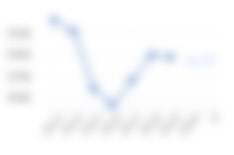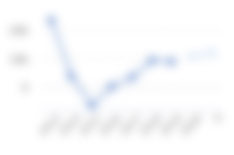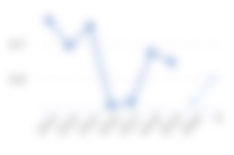- CA$9.35m
- CA$11.34m
- CA$4.69m
- 27
- 57
- 40
- 36
Growth & Value
| 12m Forecast Rolling | Industry | Market | |
|---|---|---|---|
| PE Ratio (f) | n/a | ||
| PEG Ratio (f) | n/a | ||
| EPS Growth (f) | n/a | ||
| Dividend Yield (f) | n/a | ||
| Valuation (ttm) | Industry | Market | |
|---|---|---|---|
| Price to Book Value | 0.39 | ||
| Price to Tang. Book | 0.39 | ||
| Price to Free Cashflow | n/a | ||
| Price to Sales | 2.82 | ||
| EV to EBITDA | n/a | ||
Shareholder Activity
| Type | Buy / Hold / Sell |
|---|---|
| Institutions | |
| Directors | |
| Community |
Guru Screens
Quality
| Name | Industry | Market | |
|---|---|---|---|
| Return on Capital | -18.5% | ||
| Return on Equity | -20.4% | ||
| Operating Margin | -165.33% | ||
Financial Summary
| Year End 31st Dec | Unit | 2020 | 2021 | 2022 | 2023 | 2024 | 2025E | 2026E | CAGR / Avg |
|---|---|---|---|---|---|---|---|---|---|
| Total Revenue | CA$m | 0.97 | 3.14 | 5.73 | 2.98 | 4.69 | n/a | n/a | 17.72% |
| Operating Profit | m | ||||||||
| Net Profit | m | ||||||||
| EPS Reported | |||||||||
| Diluted Normalised EPS | |||||||||
| EPS Growth | % | n/a | n/a | +2444.44 | n/a | n/a | n/a | n/a | n/a |
| PE Ratio | x | ||||||||
| PEG | |||||||||
| Profitability | |||||||||
| Operating Margin | % | ||||||||
| ROA | % | ||||||||
| ROCE | % | ||||||||
| ROE | % | ||||||||
| Cashflow | |||||||||
| Op. Cashflow ps | |||||||||
| Capex ps | |||||||||
| Free Cashflow ps | |||||||||
| Dividends | |||||||||
| Dividend ps | |||||||||
| Dividend Growth | % | ||||||||
| Dividend Yield | % | ||||||||
| Dividend Cover | x | ||||||||
| Balance Sheet | |||||||||
| Cash etc | m | ||||||||
| Working Capital | m | ||||||||
| NFA | m | ||||||||
| Net Debt | m | ||||||||
| Book Value | m | ||||||||
| Diluted Weighted Average Shares | m | ||||||||
| Book Value ps | |||||||||
Other Ratios
| Leverage (ttm) | Total | - Intang | + Pension |
|---|---|---|---|
| Gross Gearing | |||
| Net Gearing | |||
| Cash / Assets |
| Liquidity (ttm) | |
|---|---|
| Curr. Ratio | |
| Quick Ratio | |
| Interest Cov. | |
| Efficiency (ttm) | |
|---|---|
| Asset Turnover | |
| Recs Turnover | |
| Stock Turnover | |
Recent History
| Latest interim period vs. prior period | Industry | Market | |
|---|---|---|---|
| Sales Growth | |||
| EPS Growth | |||
| 3yr Compound Annual Growth Rate | Industry | Market | |
|---|---|---|---|
| Sales CAGR | |||
| EPS CAGR | |||
| DPS CAGR | |||
Profile Summary
Pulse Oil Corp. is a Canadian company that is primarily focused on a 100% working interest in the enhanced oil recovery (EOR) Project located in West Central Alberta, Canada. The project includes two Nisku pinnacle reef reservoirs that have been producing sweet light crude oil for over 40 years. The Company's 100% owned and operated Bigoray Assets consist of proved and probable reserves of approximately 5,324,400 barrels of oil equivalent (BOE) and cover approximately 3,941 net acres of land. The Company also operates and has a 100% interest in Queenstown Assets, which consist of approximately 183,000 BOE and consists of 4,781 net acres of land. Its wholly owned subsidiary is Pulse Oil Operating Corp.
Directors

- Address
- Suite 500, 666 Burrard Street, VANCOUVER, V6C 3P6
- Web
- https://pulseoilcorp.com/
- Phone
- +1 6049091152
- Auditors
- MNP LLP
Upcoming Events for PUL
Q1 2026 Pulse Oil Corp Earnings Release
Similar to PUL
Africa Energy
TSX Venture Exchange
Altai Resources
TSX Venture Exchange
Altima Energy
TSX Venture Exchange
Alvopetro Energy
TSX Venture Exchange
Angkor Resources
TSX Venture Exchange
FAQ
As of Today at 12:46 UTC, shares in Pulse Oil are trading at CA$0.02. This share price information is delayed by 15 minutes.
Shares in Pulse Oil last closed at CA$0.02 and the price had moved by over the past 365 days. In terms of relative price strength the Pulse Oil share price has underperformed the Toronto Stock Exchange 300 Composite Index by -21.64% over the past year.
The overall consensus recommendation for Pulse Oil is Buy. You can view the full broker recommendation list by unlocking its StockReport.
Find out morePulse Oil does not currently pay a dividend.
Pulse Oil does not currently pay a dividend.
Pulse Oil does not currently pay a dividend.
To buy shares in Pulse Oil you'll need a share-dealing account with an online or offline stock broker. Once you have opened your account and transferred funds into it, you'll be able to search and select shares to buy and sell. You can use Stockopedia’s share research software to help you find the the kinds of shares that suit your investment strategy and objectives.
As of the previous close price of CA$0.02, shares in Pulse Oil had a market capitalisation of CA$9.35m.
Here are the trading details for Pulse Oil:
- Country of listing: Canada
- Exchange: CVE
- Ticker Symbol: PUL
Based on an overall assessment of its quality, value and momentum Pulse Oil is currently classified as a Neutral. The classification is based on a composite score that examines a wide range of fundamental and technical measures. Stock are classified on the the following spectrum: Super Stocks, High Flyers, Contrarians, Turnarounds, Neutral, Value Traps, Momentum Traps, Falling Stars, and Sucker Stocks. For more information, learn about our StockRank Styles.
The analyst consensus target price for shares in Pulse Oil is CA$0.15. That is 900% above the last closing price of CA$0.02.
Analysts covering Pulse Oil currently have a consensus Earnings Per Share (EPS) forecast of for the next financial year.
Find out moreAn important predictor of whether a stock price will go up is its track record of momentum. Price trends tend to persist, so it's worth looking at them when it comes to a share like Pulse Oil. Over the past six months, its share price has underperformed the Toronto Stock Exchange 300 Composite Index by -14.46%.
As of the last closing price of CA$0.02, shares in Pulse Oil were trading +2.56% higher than their 200 day moving average. You can read more about the power of momentum in assessing share price movements on Stockopedia.
The Pulse Oil PE ratio based on its reported earnings over the past 12 months is null. The shares last closed at CA$0.02.
The PE ratio (or price-to-earnings ratio) is the one of the most popular valuation measures used by stock market investors. It is calculated by dividing a company's price per share by its earnings per share.
The PE ratio can be seen as being expressed in years, in the sense that it shows the number of years of earnings which would be required to pay back the purchase price, ignoring inflation. So in general terms, the higher the PE, the more expensive the stock is.
Pulse Oil's management team is headed by:
- Drew Cadenhead - PRE
- Garth Johnson - CEO
- Aaron Doyle - CFO
- Daniel Bolstad - IND
- John Doyle - IND
- Douglas Ellenor - IND





